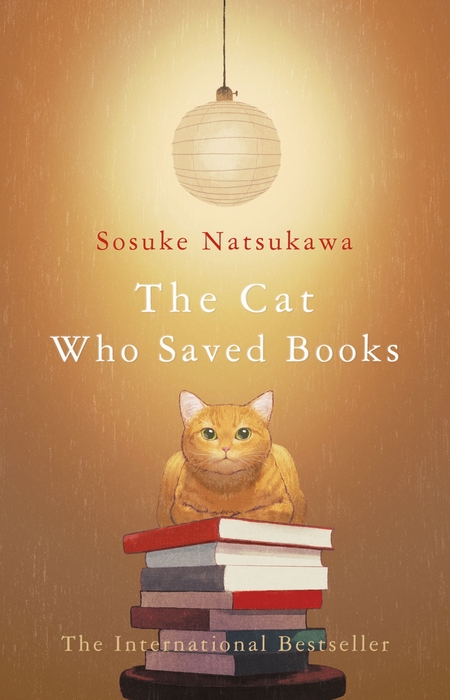If you have been an avid reader like this reviewer, you will know deep inside yourself that books are rare and precious things capable of illumination, escapism, companionship and real empathy and warmth.
They matter and they speak to us because they are, by and large, created by people who know the power of life, living, imagination, solace and hope and who have poured all these hallmarks of human experience and more into the persuasively beautiful stories they have woven.
But as Sosuke Natsukawa says in The Cat Who Saved Books (translation by Louise Heal Kawai) with gentle power and conviction, and rich understanding of the human condition, they are also there to be read, to be used, to be alive and to exist with purpose and we need to balance the need to safeguard their preciousness with the fact that they are almost living, breathing things that must be allowed to be active out in the world.
It is this duality of existence that underpins the wondrous within this novel that exists partly as a love letter to books but also as a touchingly visceral exploration of grief and loss, which the author notes can happen both before and after the death of a loved one.
Rintaro Natsuki is a teenage boy who lives with his grandfather in a small Japanese town on the edge of which sits a gloriously cluttered tiny secondhand bookshop in which the works of Voltaire and Shakespeare, Faulkner and Dumas, and a veritable host of learned minds and literary talents have their works on loving, well-tended display.
“The cat spoke quietly, but its voice resonated to the pit of Rintaro’s stomach.
‘Don’t give in to loneliness. You aren’t alone. You have many friends looking out for you.’
Its parting words were heartfelt, encouraging. Rintaro fought off the questions that came to his head and simply looked back in silence.” (P. 152)
Established as a means of bringing some good to the world, the bookshop is not a path to riches, fame or glory, but exists to fulfill a noble purpose of bringing knowledge and understanding to people, its goal to ensure the books don’t sit just on shelves but are picked up, bought, read and always in circulation as a way of burnishing the human experience.
In this world Rintaro has found real sanctuary where he lives as a hikikomori, which translator Louise Heal Kawai defines as literally meaning “to pull in wards and confine, [refering] to people, often young men, who have consciously decided to shut themselves away from society, rarely venturing outside to school or work.”
He does go to school, and has people who care about him, those he initially believes he has no friends at all, such as classmate Sayo Huzuki and senior classman Ryota Akiba, but by and large he finds a refuge in books, respite from a world in which his parents are dead and his social skills simply aren’t up to the task of being actively human.
Then Rintaro’s grandfather dies, leaving Rintaro both bereft and unmoved at once, a young man uncertain about whether he should stay where he is in the bookstore that has become home or move to a faraway town with a kindly aunt he’s never met, who means well but who is offering a life that takes him away from the only place he’s ever felt he belongs.
With so much on his existential plate, you could well understand if Rintaro simply decides to pull up the drawbridge, such as it is, and retreat into the bookshop never to be seen again.
But neither his friends, nor a magical ginger cat called Tiger, who’s all attitude and strange arrivals and departures up and down hallways that didn’t exist a moment before, will let him, and whether Rintaro wants it or not, he’s suddenly on adventures to save books from people who have lost appreciation for the great difference books can make in your life and that while they are utilitarian objects in part, they are far, far more than that.
Ostensibly a rescue mission for books that have been “imprisoned, mistreated and betrayed”, The Cat Who Saved Books is a great deal more because as Rintaro heads down to labyrinths to places that defy the laws of physics and logicality, he comes face to face time and again with what it means to be human and how easily it can get buried, muddled, lost or broken.
This is this extraordinarily thoughtful and insightfully gentle novel’s true gift – it understands that even the best of people lose their way for a host of reasons and that coming alive again often takes the work of close friends, reality-breaking visitors such as Rintaro and, of course, magical cats.
“There was a silence so deep it seemed to swallow everything. Rintaro peered into the darkness but he couldn’t see the womna. Undaunted, he continued to speak to the presence he knew was out there.
‘Books are filled with human thoughts and feelings. People suffering, people who are sad or happy, laughing with joy. By reading their words and their stories, by experiencing them together, we learn about the hearts and minds of other people besides ourselves. Thanks to books, it’s possible to learn not only about the people around us every day, but people living in totally different worlds.'” (P. 196)
At its movingly expansive, incisively written heart, The Cat Who Saved Books is a love letter to compassion and caring, of going beyond yourself, and far beyond your comfort zone, to make a difference in the lives of others.
It is also an empathetic clarion call to seize courage and embrace bravery in the face of all challenges, not because daring to stand up to the odds should be undertaken for its own odds, but because when that happens something changes within us, empowering us to become someone else, someone entirely different who might just find out what being truly alive actually feels like.
Charming and sweet and much as it is confronting in a wholly constructive way, The Cat Who Saved Books is a lovely novel that warms the heart even as it challenges to live and love again.
That may sound a little twee but the story is far from that, embracing life as it is in all its flawed, muscular brokenness but refusing to say that’s the end of the tale, just as it refuses to see books as simply ends in themselves but rather as windows and doorways to new worlds and possibilities that should be honoured but not deified, treasured but not locked away from active use and appreciation.
The Cat Who Saved Books is a quiet, powerful persuasive gem that offers action and adventure even as it sits with you, in your grief, lostness or purposelessness, knowing that you are hurting but that life still awaits and that books are a likely way to that rediscovery of the transformative business of living, bring you back to the land of the actively engaged in ways that seem impossible but which ultimately relight the spark that perhaps you hadn’t realised had gone out and which you need if you are to truly love again.

